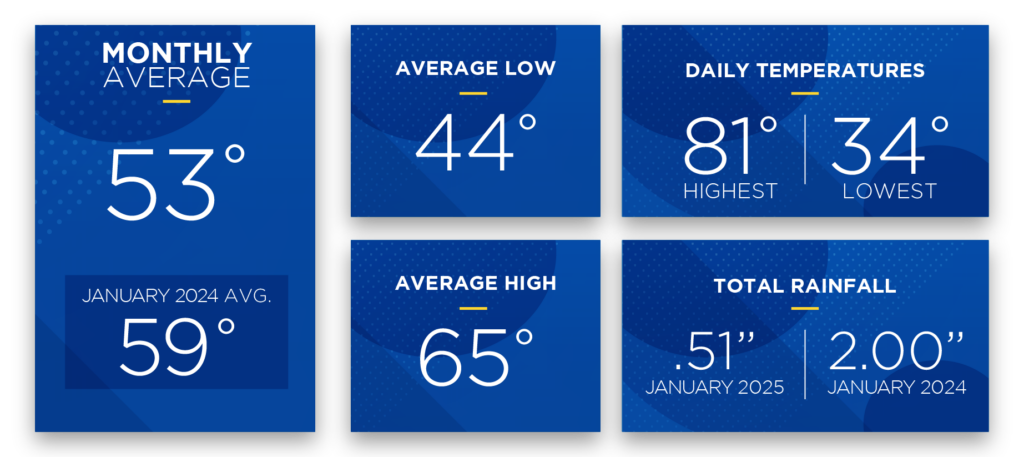January 2025 Sunshine State Stats
In January 2025, the monthly average temperature fell by 9 degrees from December, and the total rainfall was just .51 inches.
The average temperature in January was 53 degrees, which is 7 degrees cooler than the typical average. The average high for the month reached 65 degrees, also 7 degrees lower than the average high in December. Similarly, the average low temperature fell to 44 degrees, 8 degrees lower than in December.
The highest temperature of the month was 81 degrees on the last day of January, and the lowest was 34 degrees on January 25th.
The January 2025 rainfall of just over one-half inch was well below the January average of 3.12 inches and 1.5 inches below the December 2024 total. Measurable rainfall occurred on six days, with only three days experiencing more than .1 inch of rain.
Thunderstorm activity within a 20-mile radius of Leesburg International Airport occurred on just one day: January 19, during which a total of 64 cloud-to-ground strikes were recorded. The image below shows the location of the strikes as documented by WeatherSentry within the 20-mile radius of Leesburg International Airport (KLEE).
Lightning Archive Report – 20-mile radius from Leesburg International Airport (KLEE)
Cloud to Ground Lightning – January 19, 2025
Data and charts provided by weathersentry.dtn.com
February Forecast from The Old Farmer’s Almanac:
The Old Farmer’s Almanac predicts that February in Central Florida will bring a mix of cool temperatures, rain, and sunshine. The month starts off with rainy periods and cool weather from February 1-12, so keeping an umbrella and a light jacket handy will be a good idea. From February 13-16, conditions will improve with sunnier skies and milder temperatures, making for pleasant outdoor activities. Between February 17-23, expect mostly sunny weather at first, followed by heavy rain and a noticeable drop in temperatures. The month will close out with sunshine from February 24-28, but very cold conditions will settle in before gradually warming up again. Overall, temperatures will average 59°F, about 3° below normal, while precipitation is expected to total 2.5 inches, with drier-than-usual conditions in the north and wetter conditions in the south. Expect a cooler-than-average February with a mix of sun, rain, and occasional cold snaps.
SECO Smart Connect Program: A New Way to Save on Your Electric Bill
Thousands have already enrolled—and there’s still room for you to help reduce the impact on the electric grid during times of peak energy usage and save money, too!
Review our new SECO Smart Connect Program – this is an opportunity for members to receive bill credits for allowing SECO Energy to make brief changes to the settings on residential devices during times of peak energy demand. Residential members who enroll in the SECO Smart Connect Program will receive enrollment and seasonal incentives via bill credits based on the type of device(s) enrolled. Learn more and enroll here.
Protect Your Appliances
Power surges are sudden, powerful increases in voltage that can damage or destroy household appliances and electronics. SECO Energy’s Surge Mitigator™ program offers a meter-based surge arrester designed to protect large appliances, such as motors and compressors, by reducing surges at the meter before they enter your home. Members can lease or purchase the Surge MitiGator surge protection program by completing a contact form.








